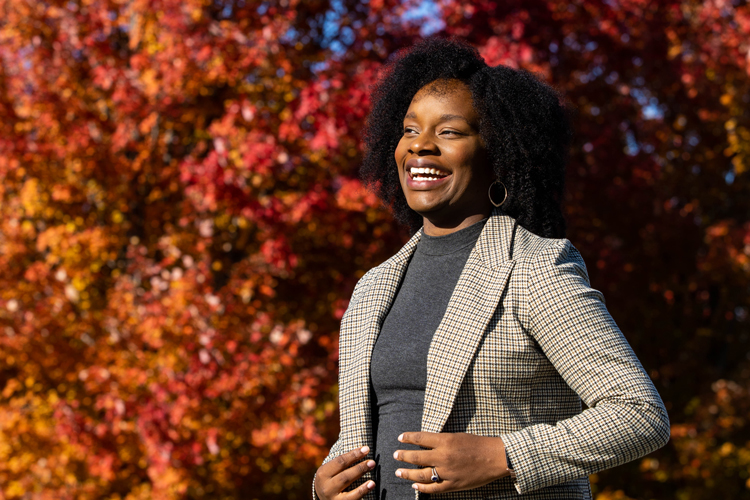Ask any seasoned professional if they’re still doing what they thought they would be doing in college, and you’ll likely hear stories of unexpected pivots, discoveries and transitions (sometimes several times over).
That adaptability is one of the lessons students learn while at the School of Law — how to continue learning and growing after graduation, even if it takes them outside their predicted career path.
These are the stories of three UMKC alumni who stayed open to new opportunities, igniting new passions and interests along the way.
Tim McNamara (J.D. ’80), Chief Legal Officer, BKD, LLP
Tim McNamara (J.D. ’80) has always loved being in the midst of the action. After graduating from the UMKC School of Law, he went straight into business litigation at the firm now known as Lathrop GPM, handling trials, arbitrations and mediations for well-known clients like John Deere and The Kansas City Star. He even became the firm’s municipal court lawyer early in his career.
“Everything’s a lot more specialized these days, but I was lucky enough to have a diverse set of experiences,” he says.
Over the years, McNamara built relationships, took on high-stakes cases and made partner. One day in 2015, his long-time client, BKD, approached him asking for advice on hiring their first chief legal officer. By the time the conversation was over, he had a job offer.
“I hadn’t thought about it until they suggested it that day, but the idea appealed to me,” he says.
Though he knew them well as a client, McNamara says joining BKD was much more of a change than he imagined. Not only was he working more independently, but he also learned to be comfortable being more involved in the decision-making process, functioning as both lawyer and client.
“To me, it’s been one of the more challenging and rewarding parts of the job,” he says. “I had to learn so much about the business world. I’d always thought that getting an MBA would be interesting and fun. I kind of got a mini-MBA on the job.”
His 36 years of broad, diverse experience at Lathrop proved beneficial, as did his experience managing and working with a legal team. He doesn’t see the inside of a courtroom much these days, but McNamara says that’s okay with him.
“I’m enjoying the challenge of what I’m doing now so much that I haven’t missed it at all,” he says.
And now another transition is in store for McNamara, who recently announced he will retire May 31, 2022, almost exactly 42 years since he started practicing law. An avid cyclist, he’s now looking forward to taking more rides and spending more time with family, including his young grandchildren.

Lischen Reeves (J.D. ’18), Corporate Counsel, Privacy and Cybersecurity, Cerner
After two years working at Shook, Hardy & Bacon, LLP, Lischen Reeves says she was not looking for another opportunity. But when she came across a job posting for the corporate counsel for privacy and cybersecurity position at Cerner, she knew she had to apply.
“I told my husband, ‘This job has my name on it,’” she says. “I don’t shy away from opportunities. If it comes my way, I’ll put myself forward.”
For Reeves, it was a natural transition. As part of the business litigation team at Shook, Hardy & Bacon, she had worked on employment and complex commercial matters, but a case involving the Americans with Disabilities Act shaped her next step.
When she expressed interest in the privacy portion of the case, the senior partner she was working with encouraged her to reach out to the chair of the firm’s privacy and cybersecurity practice at Shook. It turned out they needed an expert on the Health Insurance Portability and Accountability Act (HIPAA) and privacy, so Reeves focused her career on becoming one.
“That was a pivotal moment in my career because this is exactly the work I do for Cerner,” she says.
At Cerner, Reeves has zeroed in on health-care privacy and cybersecurity. She recently completed her Certified Information Privacy Professional U.S. certification, a professional certification for privacy specialists.
As someone who knew she wanted to be a lawyer since she was in third grade, Reeves says she has always been intentional with her career, but she has also made a point to keep an open mind.
“I’m moving through this career that I didn't imagine before law school, and I am so glad about how it's turning out,” she says. “I truly thank God for my career. I also owe so much of the development of my mindset to my mother. She supported and encouraged me in every endeavor and challenged me to never stop learning and dreaming of all that could be.”

Sara Rittman (J.D. ’81), Deputy Chief Counsel, Litigation Division, Missouri Attorney General’s Office
During her four decades in the legal profession, Sara Rittman (J.D. ’81) has taken a practical approach to moving up the career ladder. More than an abrupt about-face, hers is a story of a series of shifts leading to distinct, yet related, roles. Through the years, she has worked in both prosecution and defense, with roles in public service, then private practice, then back again.
“I’m one who tends to look for things to build on,” she says.
Rittman started her career at the Missouri Attorney General’s Office, representing professional licensing agencies in the state and helping various agencies — like the nursing, podiatry and funeral director boards — with disciplinary litigation against those who violated their professional standards. Compliance and ethics became her niches. Eventually, she moved to a similar role as a staff counsel and then the deputy chief disciplinary counsel, ensuring attorney compliance with the rules of professional conduct. Next she moved from compliance to advising, serving as legal ethics counsel, where she provided informal advisory opinions to attorneys and served as counsel to the Missouri Supreme Court’s Advisory Committee.
But the most dramatic change of her career came in 2012, when she opened a private defense firm. In her private practice, Rittman helped lawyers facing complaints or ethics violations achieve compliance or answer complaints against them. She provided consultation to them on ethical questions regarding their practices. Having worked on the prosecution side for the state was helpful, Rittman says, but there was a learning curve.
“I did find that there were certainly some perspectives that I hadn’t really understood as fully as I thought I had before I actually made the change,” Rittman says. “I think it is always valuable for attorneys to be able to understand the perspectives of the people that they’re dealing with.”
Rittman re-joined the Attorney General’s Office in 2019, and in July of 2021, became deputy chief counsel in the Litigation Division, essentially the defense firm for the state. Rittman says that even though her roles have been different, some things are universal.
“At every stage of a legal career, you’re going to have to learn new things,” she says. “A constant that I’ve learned is, as a lawyer, if you are prepared and you behave professionally, those are the two most important things.”

